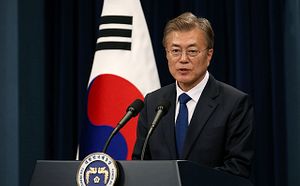Since North Korea successfully launched an intercontinental ballistic missile (ICBM) on July 4, the Korean Peninsula crisis has reached a tipping point. On July 6, newly elected South Korean President Moon Jae-in proposed his grand strategy of solving the crisis. In return, China welcomed his proposal and encouraged the international community’s support. On July 11, China emphasized that Korean Peninsula crisis is not China’s responsibility.
President Moon Jae-in made his important speech on North Korea in Berlin, Germany upon the invitation of the Körber Foundation. The grand strategy is the first detailed proposal made by Moon with specific suggestions. He argued that South Korea “must sit in the driver’s seat and lead Korean Peninsula-related issues” based on cooperation with its neighbor countries. His fundamental proposals could be summarized in two parts.
First, South Korea is only pursuing peace and will guarantee the security of the North Korean regime as long as North Korea completely dismantles its nuclear program. By emphasizing that “we do not wish for North Korea’s collapse, and will not work toward any kind of unification through absorption,” Moon urged North Korea to “come out to the forum of bilateral and multilateral dialogue on denuclearization.”
Second, Moon offered North Korea a bright economic future by including North Korea into “a new economic map on the Korean Peninsula.” Other than economic connections, Moon also requested that North Korea restart nonpolitical exchange and cooperation projects, such as allowing family reunions and private sector investment.
In terms of South Korea’s leading role, Moon said “Chinese President Xi Jinping and I also reached a consensus on this matter.”
In the regular press conference on July 10, Chinese Foreign Ministry Spokesperson Geng Shuang immediately welcomed Moon’s initiation. Geng said, “China firmly support the two sides of the peninsula to improve the relations through dialogue and hopes the two sides could both express good will.” Also, Geng encouraged the international community’s understanding and support toward Moon’s “constructive effort.”
If Geng’s reply on July 10 was still quite reserved and cautious, his wording on the regular press conference on July 11 is absolutely strong and even aggressive.
He demanded that the “China responsibility theory” must stop:
As we said repeatedly, the crux of the Korean nuclear issue rests on the conflict between the DPRK and the U.S. and it is in essence a security issue. The Chinese side is neither the focal point of the conflict of the Korean nuclear issue nor the catalyzer for escalation of tensions at present, and it does not hold the key to solving the Korean Peninsula nuclear issue.
Then Geng sharply criticized “certain people” without naming a specific person or country:
In recent days, certain people have been exaggerating and playing up the so-called “China responsibility” theory. Those people have either failed to grasp the Korean Peninsula nuclear issue comprehensively and accurately, or done this out of ulterior motives with an attempt to shirk responsibility.
Geng accused those “certain people” of “kicking down the ladder” and “stabbing in other’s back”:
If when China is busy putting out a fire while someone pours fuel on it, when China is faithfully following through on Security Council’s resolutions while someone attempts to infringe upon China’s legitimate rights and interests, and when China is working vigorously to advance the denuclearization of the Korean Peninsula while someone seeks excuse to endanger China’s security interests, then how can China’s efforts work out as expected? How can the situation be eased? And how can the Korean Peninsula nuclear issue be resolved?
Given that South Korea has offered to “sit in the driver’s seat” and play the leading role, it is undoubtedly a great relief for China, at least temporarily.
Charlotte Gao holds a MA degree in Asian Studies. Her research interests center around East Asian topics. She has worked in the past as a news editor, reporter, and writer for multiple traditional, online, and new media outlets.

































